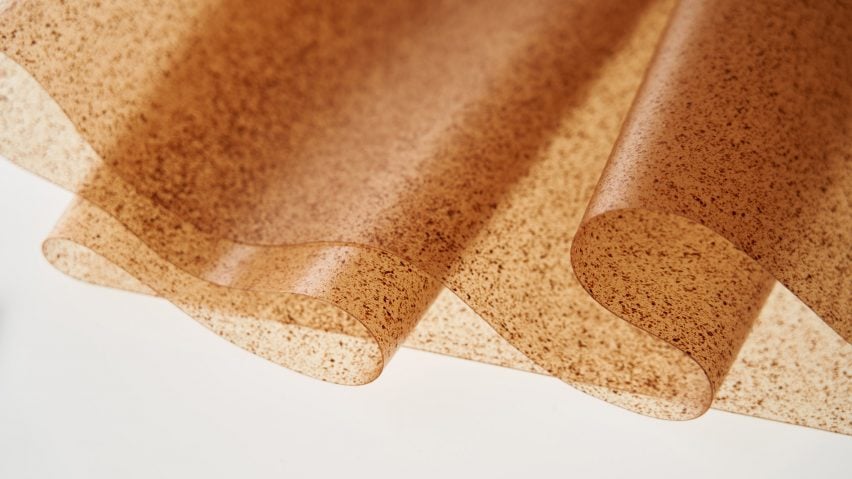Japanese design studio Sozai Center has created Adam Sheet, a washable and scratch-resistant biomaterial made of leftover apple pomace mixed with bioplastic.
Studio founder Shotaro Oshima and his team created the earthy-hued biotextile using apple pomace salvaged from Japan's Aomori Prefecture – one of the country's leading apple production areas.
Adam Sheet is a translucent speckled material made of "every part" of the pomace, including the flesh, skin, seeds and stem.
Sozai Center ground the pomace into a fine powder, which is first adjusted to the correct moisture and sugar content, according to Oshima.
After this, the pomace powder was combined with a small amount of bio-based polyvinyl chloride (PVC) to bind the finished sheet together.
"Almost 87 per cent of the sheet is made out of pure apple pomace," said Oshima, who told Dezeen that the material does not contain any fossil-derived plastic.
The designer likened the seasonal production process to making wine and explained how the colour of the material "varies from year to year, depending on the moisture and sugar content of the batch of apples".
"The colour of the sheets reflects these changes," he added.
Playfully named after Adam's apples, Adam Sheet was designed in response to the large volume of apple waste created in Aomori Prefecture each year – something that Oshima said has become a "big issue".
The waterproof material is machine-washable and scratch-resistant, according to Oshima.
However, being made from a mix of food waste and bioplastic will likely make Apple Sheet difficult – if not impossible – to recycle.
So far, Adam Sheet has been turned into bank and travel card cases as well as small crossbody pouches.
Oshima said that Sozai Center is currently testing the boundaries of the material and has plans to transform it into fashion, furniture and interior design.
"Adam Sheet can be sewn, easily cut and transmits light – characteristics applied to fashion," explained the designer.
Elsewhere, Australian studio Great Wrap has used potato waste to create a compostable bioplastic alternative to clingfilm while design studio Tomorrow Machine produced GoneShells, a biodegradable juice bottle made from potato starch that can be peeled away like fruit skin.
The photography is courtesy of Sozai Center.

